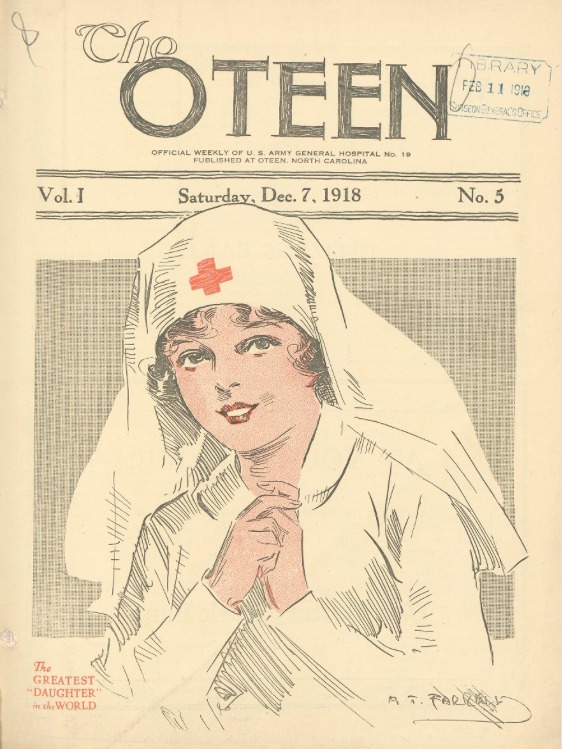The Oteen launched on Nov. 9, 1918. The weekly publication offered medical advice, hospital gossip, humorous bits and general news to the World War I soldiers seeking treatment for tuberculosis at General Hospital No. 19 (today’s Charles George VA Medical Center).
The magazine also featured columns written by some of the charitable organizations located on-site, including the Red Cross and YMCA. In the first issue, the Red Cross noted the completion of its main building (the balcony of which served as The Oteen’s “small Editorial room”). To celebrate, a dance was held, with music provided by the Asheville Orchestra. It marked the first of a series of events the organization would host for the hospital’s commissioned officers and enlisted men.
Two days after the publication’s debut, Germany surrendered; the war was over. In the subsequent Nov. 16 edition of The Oteen, the YMCA reminded readers that while fighting had ceased, work remained. Another year would pass before the army demobilized, the organization asserted, “and this period will call for even larger effort on the part of these various organizations, as the boys will have more leisure and opportunity for entertainment.”
The Red Cross echoed the YMCA’s point in the Nov. 23 publication. In its column, the organization highlighted the work it was still performing, with an emphasis on its distribution of goods to soldiers in recovery at General Hospital No. 19. Items included 3,500 knitted woolen articles, 140 convalescent robes, 15 Victrolas, 125 Victrola records, one piano and copies of The Asheville Citizen in each ward.
In addition, the Red Cross wrote:
“[W]e have made more than 50 loans to needy patients and men going on furloughs. We have cashed money orders and checks for patients and sent money for them, sent telegrams, handled allotment and allowance complaints, taken up back pay complaints with the military authorities, had patients’ clothing repaired, referred requests for employment of patients’ families to the Asheville Chapter, cared for parents visiting patients, written letters to patients’ families, done shopping in Asheville for patients and filled a great many other miscellaneous requests. The number of these various items of service has averaged from 300 to 400 a week.”
Such deeds did not go unnoticed. Along with providing information to the infirm, the weekly publication also encouraged those in recovery to contribute to the magazine. Participation took many forms.
In a separate section of the Nov. 23 issue, one soldier offered a poem titled “The Red Cross Nurse.” In it, the poet (who signed with only his initials “M.J.”) wrote of the soothing and steadfast care that these nurses provided the injured and dying soldiers. The poem’s final stanza concluded:
“When all the wounds of war are healed
And hate’s grim sorrows fade,
With pulsing heart we’ll read the part
The Red Cross Nurses played;
And in our minds will always gleam
A vision fair in white
That brought sweet joy to the soldier boy
Whose blood flowed in the fight.”
By early December, the Red Cross hosted its latest party in the organization’s newest building, the “Convalescent House.” According to the Dec. 7 issue of The Oteen, “The two hundred and fifty convalescent patients, who were the guests, enjoyed an informal social evening — popping corn, bobbing for apples and playing cards.” Music was played at the festivity and fruit punch served, as well. Meanwhile, “a number of amusing stunts [were performed] by the boys themselves.”
In that same week’s issue, another poem was published. Titled “To Our Red Cross Nurses,” the work praised the unwavering attention and care these women brought to the men at General Hospital No. 19.
The poem’s final stanza declared:
“It’s surely not a pleasant task,
And it sure would make me curse,
But what would we poor soldiers do
If it wasn’t for the nurse?
Now if Providence proves kind to me,
And I live through this awful strife,
I think I’ll look for a Red Cross Nurse
And settle down for life.”
Editor’s note: Peculiarities of spelling and punctuation are preserved from the original documents.




Another great read Thomas!